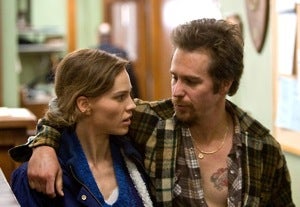Talk about déjà vu.
Last year, everyone was talking third Oscar for Hilary Swank in “Amelia” — until the film actually arrived, at which point any discussion of Oscar stopped in its tracks. Now comes “Conviction,” which arrived here with the bloggers again spouting and predicting Swank as an odds-on nominee. It – and Swank — clearly will leave the festival more quietly than they came in.
 Based on a true story, “Conviction” is in the vein of “Erin Brockovich,” which should please audiences but makes for a familiar sort of film, almost a made-for-television feel to it. (Of course, much of what is being done for TV these days is stronger than what we see at the movies.)
Based on a true story, “Conviction” is in the vein of “Erin Brockovich,” which should please audiences but makes for a familiar sort of film, almost a made-for-television feel to it. (Of course, much of what is being done for TV these days is stronger than what we see at the movies.)
To be fair, it must be said, though, that director Tony Goldwyn does an excellent job with his cast, and tells the story with a straightforward honesty that is precisely what the script calls for. These are normal Americans, with real troubles, struggling to make ends meet.
As she did in “Million Dollar Baby,” Swank plays a ryoung single mother of two, Betty Anne Waters, who simply will not take no for an answer and believes she is right in all matters concerning her brother, who has been accused and convicted of murder. Thinking him incapable of the crime, she fights the system at all costs — with no avail. Finally, she decides to go through law school so she can become a lawyer and get her his conviction overturned. Along the way she discovers evidence that points to the fact he may in fact be guilty — but It doesn’t diminish her belief in him.
Swank grabs the role and gives it all she's got, giving audiences more than a few scenes speaking softly through glistening tears, and then showing how tough she can be. She plays it well, as she should — it is familiar ground for her. There is nothing new in her performance, no real evolution from her as an artist. Audiences will cheer for her, but that’s more because of the manipulative screenplay than Swank herself.
The real performance in the film comes from Sam Rockwell, who is superb as Waters’ brother Kenny. He hardens in prison, and though proud of his sister, he grows tired of the waiting as the years slip past. One can see the hope slipping out of Rockwell's eyes — in direct counterpoint to Swank. He steals every scene he’s in — and again gives us a character we have not seen before.
Melissa Leo does fine work as a cop with a chip on her shoulder, and Minnie Driver — after her terrific work in another TIFF entry, “Barney's Version” — is excellent Betty Anne’s best friend Abra. Theirs is a curious friendship, almost like a marriage, as Abra is the one who supports Betty Anne and sees her through the troubles to the bitter end.
This is a film about finding hope when there is none, about finding redemption when all looks hopeless, and about trust. And about knowing a person you love could not have possibly done what they have been accused of doing, for the simple reason that you know them.
But Oscar bait for its lead actress? Not likely.
(An earlier version of this story incorrectly stated that "Amelia" played at last year's Toronto Film Festival. That was incorrect, and we apologize for the error.)